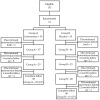Effect of Supplementation with a Specific Probiotic (Bifidobacterium bifidum PRL2010) in Pregnancy for the Prevention of Atopic Dermatitis in Children: Preliminary Results of a Randomized Trial
- PMID: 40005000
- PMCID: PMC11858544
- DOI: 10.3390/nu17040673
Effect of Supplementation with a Specific Probiotic (Bifidobacterium bifidum PRL2010) in Pregnancy for the Prevention of Atopic Dermatitis in Children: Preliminary Results of a Randomized Trial
Abstract
Background: Atopic dermatitis (AD) is a chronic inflammatory skin disease characterized by the appearance of recurrent eczematous lesions and intense itching. The World Allergy Organization (WAO) suggested the administration of probiotics in pregnant women at high risk of allergies in their children.
Objectives: Our study aims to evaluate the role of administering the Bifidobacterium bifidum strain PRL2010 during pregnancy and breastfeeding in preventing and/or reducing the severity of AD manifestations in children.
Methods: It is a monocentric, randomized, double-blind, placebo-controlled trial with probiotic/placebo administration since the 36th week of gestation to mothers with atopy or a family history of atopy; the effects were evaluated over the first 12 months of the children's lives.
Results: No severe adverse effects due to probiotic intake were reported in our cohort. Although proportionally fewer children with AD were in the probiotic group, the statistical analysis showed no significant differences between the probiotic and placebo groups. However, infants who developed the most severe forms of AD in the probiotic group showed a better clinical course during follow-up compared to those in the placebo group.
Conclusions: In conclusion, administering the probiotic Bifidobacterium bifidum strain PRL2010 during pregnancy and breastfeeding is safe and potentially beneficial; further large-scale studies may confirm its usefulness in improving the clinical manifestation of AD in children with a family history of atopy.
Keywords: SCORAD; allergy; atopic dermatitis; infancy; microbiota; pregnancy; probiotics.
Conflict of interest statement
The authors declare no conflicts of interest.
Figures
References
Publication types
MeSH terms
LinkOut - more resources
Full Text Sources
Medical


